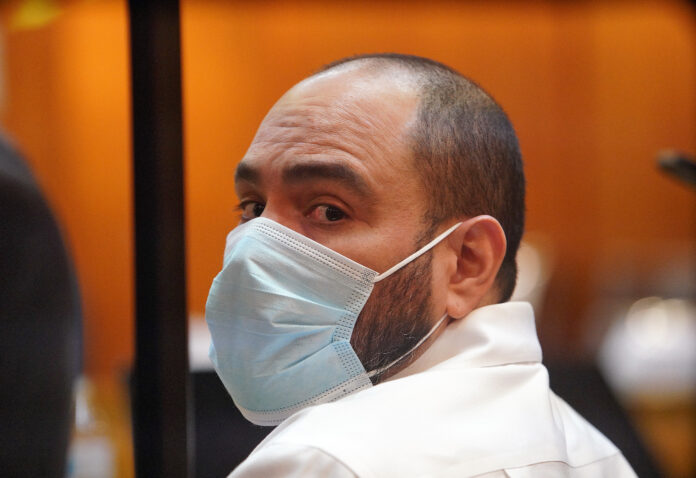
The lead investigator for the 1998 fatal shooting at South Texas College took the stand Monday, detailing an unusual interrogation that took place in a Reynosa hotel room.
Ricardo Tamez testified for nearly four hours in the fourth day of testimony in the trial of 42-year-old Roberto Ivonovich Ojeda Hernandez, who was charged with capital murder for his alleged role in the Jan. 13, 1998, shooting death of 32-year-old security guard Carlos Hernandez during an armed robbery.
Three other people were sent to the hospital with wounds from bullet shrapnel after the shooting.
Ojeda has pleaded not guilty and was not extradited to the United States until March 2019.
Hernandez worked for a private security company and was assigned to STC when two gun-wielding men held up classroom B-106 where payments were being made by students for a semester of classes.
Testimony has differed on whether there were two men or one man and the types of weapons — rifles or a rifle and a handgun — involved in the shooting.
Tamez confirmed Monday that investigators believe that only one, large caliber, weapon was fired in classroom B-106.
However, the vast majority of the former investigator’s testimony centered around questions regarding his trip to Reynosa where crime scene investigator Heriberto Vigil took a 34-minute long video of Ojeda inside that hotel room where he confessed.
Tamez said he thought it was odd that the interrogation happened at a hotel and not at the police station and explained that Mexican police told him that they did not have an interview room.
There were also concerns from Tamez, who said Mexican police shared those concerns, about conducting the meeting at the police station because the brothers of another suspect, Jesus Lara, were Mexican police officers.
That interview happened Feb. 2, 1999, and Ojeda implicated Lara during that meeting.
Days later, on Feb. 6, 1999, McAllen police arrested Lara and charged him with capital murder and he was indicted on April 29, 1999, court and jail records indicate.
However, on Aug. 27 of that year, state District Judge Rose Guerra Reyna, who is presiding over Ojeda’s trial, granted a motion to dismiss the charges the Hidalgo County District Attorney’s Office filed against Lara.
That motion just says the charges were dropped in the interest of justice and the reason behind the dismissal has not yet surfaced during witness testimony or attorney arguments.
Tamez also testified that before that hotel room interrogation, he, along with a Texas Ranger, an FBI agent and Mexican police, conducted surveillance outside of an OXXO convenience store where Tamez believed Ojeda worked.
The former investigator said Mexican police were not wearing uniforms and were in unmarked SUVs. He also said Ojeda resisted when Mexican police went to either detain or arrest him for a vehicle theft before he was placed in an unmarked vehicle and taken to the hotel.
The alleged getaway car used after the shooting was stolen from an area of Reynosa where Ojeda lived and near the residence Lara had listed on his Mexican driver’s license.
During cross examination, defense attorney Mauricio Martinez hammered home questions about the way Ojeda was picked up for interrogation, asking Tamez whether he knew if Ojeda was harmed while in the vehicle and alluding that perhaps Ojeda thought he was being kidnapped.
Martinez also questioned Tamez about his testimony in which he said he asked the Mexican official in charge — in the nicest way possible — not to harm Ojeda.
This reportedly happened at the hotel because the Mexican officer went into the room alone with Ojeda before the United States officials went inside.
The defense attorney repeatedly asked Tamez whether he made the request because he feared that people were often harmed during interrogations in Mexico, to which Tamez said he would not and could not make that generalization.
“I wanted to take a video tape of him and I didn’t want anyone to touch him,” Tamez said.
After the hotel interrogation, Tamez said everyone then went to the Mexican police station where he then met with Ojeda and his mother. He asked Ojeda whether he would voluntarily cross into the United States, but he declined.
Mexican police let him go later that day.
Tamez then came back to the United States and drafted an arrest warrant for Ojeda. However, the investigator testified Monday that he couldn’t say whether anyone at the McAllen Police Department initiated a formal extradition request with Mexico.
“I just knew he was running for his life,” Tamez said.
Testimony is scheduled to continue Tuesday afternoon.
Earlier articles
Trial begins in 1998 death of STC security officer
Crime scene investigators recall ‘98 shooting at STC
Palm print in question in ’98 STC shooting trial



